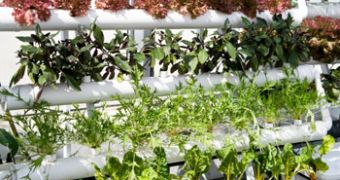With the U.S. currently facing persistent economic uncertainty and struggling to keep its head above the surface, people are trying to find ways to at least create an accessible, sustainable and healthy food system.
The newly-formed Recirculating Farms Coalition thinks it has found the answer to that, and has engaged in a national campaign to raise awareness of the benefits that growing local, fresh food bring.
Not only do recirculating farms create green jobs, but they are also space, energy and water efficient. They use recycled water in place of soil to grow plants (hydroponics), fish (aquaculture), or a combination of both plants and fish (aquaponics).
“The current U.S. unemployment rate is 9.1 percent, and about one in six people are struggling to buy food. Building recirculating farms in diverse communities nationwide can provide fresh, local food and create stable jobs in a sustainable business, two things the U.S. very much needs right now,” stated Marianne Cufone, Executive Director of the Recirculating Farms Coalition.
“The United States is in one of its worst economic situations ever. We need change, now. Building recirculating farms will help address the food and job crises by empowering communities to create new jobs growing their own food, in a way that is healthy for both us and our planet,” Cufone further added.
Recirculating farms that are well designed re-use up to 99% of their water, and recycle waste. They can use renewable energy to supply sustainably-grown plants, fruits, vegetables, and even fish.
“People are just recognizing the many incredible advantages of these systems as a novel method of farming. Now, we are joining together with others – farmers, chefs, fishermen and a new wave of aware students – in this coalition to highlight the benefits of using clean recycled water, without soil, to grow food locally, virtually anywhere, year-round. This is very significant,” said Dr. Martin Schreibman (CUNY’s Brooklyn College).
The organization also plans to provide training for farmers, build a model farm for teaching and demonstration and actively engage the public on recirculating farming issues.

 14 DAY TRIAL //
14 DAY TRIAL //